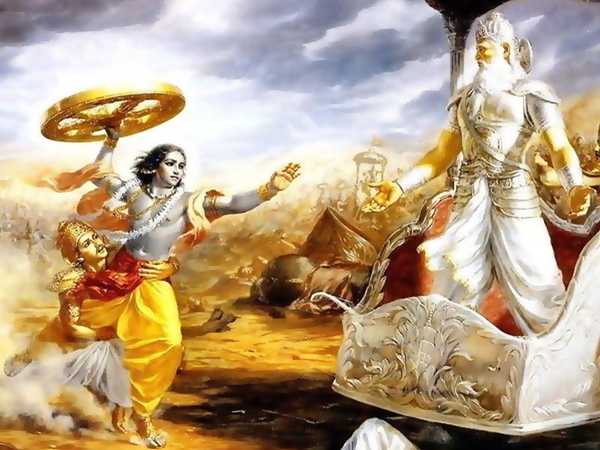Chapter 73

“Vaisampayana continued, ‘King Dushmanta, hearing all this, said,’Well-spoken, O princess, this that thou hast said! Be my wife, Obeautiful one! What shall I do for thee?
Golden garlands, robes,ear-rings of gold, white and handsome pearls, from various countries, golden coins, finest carpets, I shall present thee this very day. Let thewhole of my kingdom be thine today, O beautiful one! Come to me, O timidone, wedding me, O beautiful one, according to the Gandharva form. O thouof tapering thighs, of all forms of marriage, the Gandharva one isregarded as the first.’
“Sakuntala, hearing this, said, ‘O king, my father hath gone away fromthis asylum to bring fruit. Wait but a moment; he will bestow me on thee.’
“Dushmanta replied, ‘O beautiful and faultless one, I desire that thoushouldst be my life’s companion. Know thou that I exist for thee, and myheart is in thee. One is certainly one’s own friend, and one certainlymay depend upon one’s own self. Therefore, according to the ordinance,thou canst certainly bestow thyself. There are, in all, eight kinds ofmarriages. These are Brahma, Daiva, Arsha, Prajapatya, Asura, Gandharva,Rakshasa, and Paisacha, the eighth. Manu, the son of the self-create,hath spoken of the appropriateness of all these forms according to theirorder. Know, O faultless one, that the first four of these are fit forBrahmanas, and the first six for Kshatriyas. As regards kings, even theRakshasa form is permissible. The Asura form is permitted to Vaisyas andSudras. Of the first five the three are proper, the other two beingimproper. The Paisacha and the Asura forms should never be practised.These are the institutes of religion, and one should act according tothem. The Gandharva and the Rakshasa form are consistent with thepractices of Kshatriyas. Thou needst not entertain the least fear. Thereis not the least doubt that either according to any one of theselast-mentioned forms, or according to a union of both of them, ourwedding may take place. O thou of the fairest complexion, full of desireI am, thou also in a similar mood mayst become my wife according to theGandharva form.’
“Sakuntala, having listened to all this, answered, ‘If this be the coursesanctioned by religion, if, indeed, I am my own disposer, hear, O thouforemost one of Puru’s race, what my terms are. Promise truly to give mewhat I ask thee. The son that shall be begotten on me shall become thyheir-apparent. This, O king, is my fixed resolve. O Dushmanta, if thougrant this, then let our union take place.’
“Vaisampayana continued, ‘The monarch, without taking time to consider atonce told her, ‘Let it be so. I will even take thee, O thou of agreeablesmiles, with me to my capital. I tell thee truly. O beautiful one, thoudeservest all this.’ And so saying, that first of kings wedded thehandsome Sakuntala of graceful gait, and knew her as a husband. Andassuring her duly, he went away, telling her repeatedly, ‘I shall sendthee, for thy escort, my troops of four classes. Indeed, it is even thusthat I shall take thee to my capital, O thou of sweet smiles!”
“Vaisampayana continued, ‘O Janamejaya, having promised so unto her, theking went away. And as he retraced his way homewards, he began to thinkof Kasyapa. And he asked himself, ‘What will the illustrious ascetic say,after he has known all?’ Thinking of this, he entered his capital.
“The moment the king had left, Kanwa arrived at his abode. But Sakuntala,from a sense of shame, did not go out to receive her father. That greatascetic, however, possessed of spiritual knowledge, knew all. Indeedbeholding everything with his spiritual eye, the illustrious one waspleased, and addressing her, said, ‘Amiable one, what hath been done bythee today in secret, without, having waited for me–viz., intercoursewith a man–hath not been destructive of thy virtue. Indeed, unionaccording to the Gandharva form, of a wishful woman with a man of sensualdesire, without mantras of any kind, it is said, is the best forKshatriyas. That best of men, Dushmanta, is also high-souled andvirtuous. Thou hast, O Sakuntala, accepted him for thy husband. The sonthat shall be born of thee shall be mighty and illustrious in this world.And he shall have sway over the sea. And the forces of that illustriousking of kings, while he goeth out against his foes shall be irresistible.’
“Sakuntala then approached her fatigued father and washed his feet. Andtaking down the load he had with him and placing the fruits in properorder, she told him, ‘It behoveth thee to give thy grace to thatDushmanta whom I have accepted for my husband, as well as his ministers!’
“Kanwa replied, ‘O thou of the fairest complexion, for thy sake I aminclined to bless him. But receive from me, O blessed one, the boon thatthou desirest.’
“Vaisampayana continued, ‘Sakuntala, thereupon, moved by desire ofbenefiting Dushmanta, asked the boon that the Paurava monarchs might everbe virtuous and never deprived of their thrones.'”




